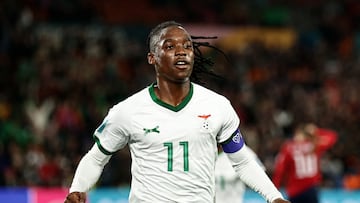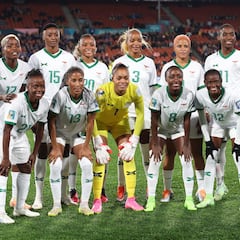The Barbra Banda story: the broader problem of gender verification in sports
What happened to Barbra Banda and why was she ruled out of Africa Women’s Cup of Nations in 2022? The broader story behind ¨stringent¨ rules for some women in sports and how Zambia’s Banda dealt with it

The Copper Queens’ leading striker, who has played in Spain and is now in China, has come through a traumatic time with her country.
When Barbra Banda showcased her talent by scoring successive hat-tricks at the 2020 Olympics in Tokyo during Zambia’s 10-3 defeat against the Netherlands and a thrilling 4-4 draw with China, she firmly established herself as a world-class striker. However, the 23-year-old, who recently became the first player to captain her country at a senior World Cup, and secured the 1,000th goal in the win over Cosa Rica, could have pursued a different career path.
Banda chose soccer over boxing
Before her football success, Banda had an impressive amateur boxing career with over 60 fights. Eventually, she decided to turn professional, winning four out of five bouts by knockout and one by a points decision. Despite her success in the boxing ring, the offer of a professional contract from the Spanish club EDF Logroño in the 2018-19 season compelled Banda to retire from competitive boxing and focus solely on her football career.
Spanish football provided Banda valuable experience, scoring 16 goals in 28 games for Logroño. The transition was transformative, and her exceptional performances led to a lucrative move to Shanghai Shengli, becoming one of the most expensive female players, with a $300,000 transfer fee.
In her opening season, she scored 18 goals, including three hat-tricks.
Too strong to be true?
After shining at the Tokyo 2020 Olympics, Banda was expected to captain Zambia in the Women’s Africa Cup of Nations (Wafcon) held in Morocco in July, 2022. Her leadership was crucial against top teams like Nigeria and Cameroon.
However, she faced a shocking disqualification. Banda didn’t meet Caf’s gender DSD rules (differences in sex development) set by the Confederation of African Football (Caf) due to elevated testosterone levels. Omitted from the squad for refusing hormone suppression treatment, she could only be an official at the tournament.
Banda’s distressing experience has been described as mentally traumatic by FAZ President Kamanga.
“It was very difficult,” Banda said.
The broader problem
“Our FA President [ Kamanga] is in Morocco and has been pursuing this matter with his colleagues in CAF,” FAZ communications director Sydney Mungala told reporters last year. “The Barbra case is just one example, but the broader picture is to strive to see how these regulations can be more responsible for the general situation -- not just Zambia.
“Many players can be affected by these regulations, and football is their livelihood. I think the CAF regulations are much more stringent [than Olympic regulations], and they put too much stress on testosterone levels.”
After Banda’s Wafcon ineligibility, chaos ensued as Faz and Caf had differing views. Caf’s communications director denied any decision from their medical committee and Faz officials ruled Banda out following Caf’s guidelines, which differ from FIFA’s. Caf mandates pre-tournament gender verification tests for female players, while Fifa relies on complaints for such tests.
Gender verification in sports
Gender verification in women’s sports is controversial, particularly affecting athletes from developing countries. Even though it wasn’t always like this, modern medical tests examine blood for gender determination. In the past, many sportswomen endured humiliating experiences, including coach Desiree Ellis, leading South Africa in the World Cup.
“I joined this team, who came to watch me play but didn’t know I was a girl,” the 60-year-old recalls. “Back then, I was tiny and flat-chested, and the moment I did something, people would say ‘she’s not a girl’.”
“My dad would say ‘pull down your shorts’ - and I did - because all I wanted to do was play.”
Semenya, Ellis, Banda: same but different
Two-time 800-meter Olympic champion runner Mokgadi Caster Semenya is the most famous case of testosterone rules affecting a sporting career, and she recently told HBO Real Sports about the effects of the testosterone suppression drugs on her body.
“It made me sick, made me gain weight, panic attacks, I don’t know if I was ever going to have a heart attack,” Semenya said. “It’s like stabbing yourself with a knife every day. But I had no choice. I’m 18, I want to run, I want to make it to Olympics, that’s the only option for me.”
Semenya chose not to take testosterone-suppressing drugs and opted to compete in track and field events that don’t require medication. When questioned about her sex by World Athletics officials, she responded bluntly.
Related stories

England vs Nigeria: how to watch

Shining the light on Zambia’s incredible football team
“They thought I had a dick, probably,” she said on the HBO program. “I told them: ‘It’s fine. I’m a female, I don’t care. If you want to see I’m a woman, I will show you my vagina. All right?’”
Caster Semenya on @RealSportsHBO this week. On when she took testosterone-suppressing medication for eligibility: "I didn't know if I was having a heart attack. It's like stabbing yourself with a knife every day, but I had no choice." pic.twitter.com/QzGMieyCqD
— Nick Zaccardi (@nzaccardi) May 23, 2022
Gender eligibility criteria have significantly improved, but the process remains complex. Currently, FIFA is reviewing its rules, which have been in place since 2011, aiming for a clearer position soon. Sarai Bareman, their chief women’s football officer, stated that they consider all views, including research, evidence, individual situations, and human rights aspects.
